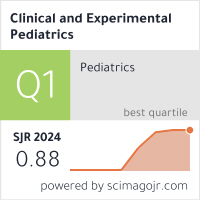
|
Purpose To evaluate the usefulness of the Korean Developmental Screening Test (K-DST) for infants and children for developmental delay assessment. MethodsThis study was based on retrospective studies of the results of the K-DST, Preschool Receptive-Expressive Language Scale (PRES), Sequenced Language Scale for Infants (SELSI), Childhood Autism Rating Scale (CARS), Modified Checklist for Autism in Toddlers (M-CHAT), electroencephalography, magnetic resonance imaging, and extensive... |




